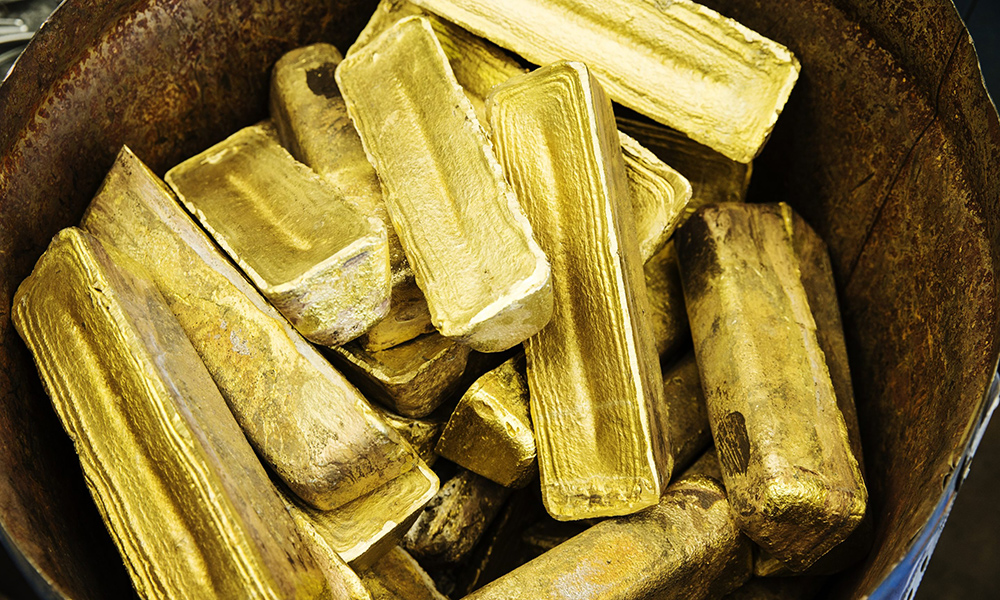
新興國家通常受制于美元。現(xiàn)在,新興國家希望減少美元儲備,轉(zhuǎn)而增加黃金儲備,以避免因為美聯(lián)儲變化莫測的政策而受到影響。
各國調(diào)整外匯儲備給美國人帶來了風險。其他國家愿意用他們的商品交換美國法定貨幣,這讓美國受益匪淺。如果更多國家選擇用其他貨幣進行貿(mào)易結(jié)算,例如人民幣,這種“去美元化”的趨勢將迫使美國財政部向外國債權(quán)人借款時支付更高利息。
世界黃金協(xié)會(World Gold Council)近日發(fā)布的對各國央行的年度調(diào)查結(jié)果顯示,發(fā)展中國家如今確實在努力減少對美元的依賴。
該行業(yè)協(xié)會代表了部分業(yè)內(nèi)最大的黃金開采企業(yè),如巴里克黃金(Barrick Gold)、紐蒙特礦業(yè)(Newmont)和安格魯阿散蒂黃金(AngloGold Ashanti)等。該協(xié)會發(fā)現(xiàn)發(fā)達國家和發(fā)展中國家的貨幣政策制定者之間存在“思想上的鴻溝”。調(diào)查結(jié)果對于美國有重要的意義,美國能否維持巨大的、持續(xù)的貿(mào)易赤字以及美國人的生活標準,都將受到影響。
世界黃金協(xié)會的年度報告稱:“各國對于美元和黃金前景的看法,分歧最為明顯。”該協(xié)會表示,從2008年全球金融危機以來,發(fā)展中經(jīng)濟體一直是購買黃金的主力,他們“對美元的未來更加悲觀,更看好黃金的未來前景”。
出現(xiàn)這種分歧的部分原因是美國利率大幅波動在新興市場造成的動蕩。當美聯(lián)儲利率接近零時,外國投資者通常會將資金投入新興市場,促進新興市場的經(jīng)濟增長,同時也會助長通脹。
當美聯(lián)儲加息時,比如去年的連續(xù)加息,這些投資者會迅速將資金轉(zhuǎn)回美國,這通常會在更脆弱的經(jīng)濟體引發(fā)經(jīng)濟衰退,更糟糕的是導致貨幣危機。
正如理查德·尼克松政府的一句名言所說:“美元是我們的貨幣,卻是你們的麻煩。”
溢出效應
當美國人都在關(guān)注最近的區(qū)域銀行擠兌和債務上限談判時,人們通常會忘記其他國家同樣因為美聯(lián)儲主席杰羅姆·鮑威爾的決策受到了嚴重影響。
經(jīng)濟學家們六年前針對美聯(lián)儲的決策寫道:“美國加息對其他國家有巨大的溢出效應,平均影響幾乎與加息對美國的影響不相上下。三年后,貨幣政策引發(fā)的美國利率上浮100個基點,使發(fā)達經(jīng)濟體和新興經(jīng)濟體的GDP分別減少了0.5%和0.8%。”
對于這些新興國家而言,唯一可持續(xù)的解決方案是通過減少對美元的依賴,不再將美元作為與鄰國開展貿(mào)易的貨幣,從而減少美聯(lián)儲政策的影響。從不斷減少的美元儲備中可以明顯看出這種趨勢。
世界黃金協(xié)會調(diào)查了未來五年全球儲備份額的變化,有58%的新興市場央行表示,以美元計價的資產(chǎn)將減少,有68%的央行預測將增加黃金儲備。只有五分之一的央行認為將維持當前水平。
相比之下,絕大多數(shù)發(fā)達經(jīng)濟體的央行預計將維持現(xiàn)狀。
美聯(lián)儲應對通脹的舉措對新興經(jīng)濟體的附帶損害令各國不滿,而七國集團對俄羅斯發(fā)起俄烏沖突的制裁進一步加劇了這種不滿情緒。一些新興國家擔心,一旦他們與西方工業(yè)化國家出現(xiàn)分歧,同樣的手段可能會施加在他們身上。
制裁和去美元化這兩個因素使各國在選擇持有黃金儲備最重要的原因上出現(xiàn)了最明顯的分歧。25%的新興市場央行提到了對制裁的擔憂,這是今年的調(diào)查中新增加的一個問題。有11%的央行表示這是其去美元化政策的一部分。但沒有任何一個發(fā)達經(jīng)濟體認為這兩個因素與持有黃金儲備有關(guān)。
去年,20%的受訪者表示,去美元化是持有黃金儲備略微相關(guān)或在一定程度上相關(guān)的因素。但今年這個比例提高到38%,其中甚至有4%的受訪者首次表示這是“高度相關(guān)”的因素。
總體上有71%的受訪者認為,全球央行未來12個月將增加黃金儲備,相比之下去年只有61%,而2021年只有52%。
央行是黃金市場的主要參與者,他們幫助維持黃金價格。最近金價上漲至超過每盎司2,000美元的歷史最高價,但央行并不會為了投機買入黃金。相反,央行主要將黃金用于對沖通貨膨脹和作為一種價值儲備。
世界黃金協(xié)會調(diào)查顯示,2022年,央行凈買入黃金總計達到1,136公噸。這不僅是各國連續(xù)13年凈買入黃金,也代表了自1950年以來的最高年度需求。其中,土耳其央行是去年黃金的最大買家,其官方黃金儲備增長了148噸。(財富中文網(wǎng))
翻譯:劉進龍
審校:汪皓
新興國家通常受制于美元。現(xiàn)在,新興國家希望減少美元儲備,轉(zhuǎn)而增加黃金儲備,以避免因為美聯(lián)儲變化莫測的政策而受到影響。
各國調(diào)整外匯儲備給美國人帶來了風險。其他國家愿意用他們的商品交換美國法定貨幣,這讓美國受益匪淺。如果更多國家選擇用其他貨幣進行貿(mào)易結(jié)算,例如人民幣,這種“去美元化”的趨勢將迫使美國財政部向外國債權(quán)人借款時支付更高利息。
世界黃金協(xié)會(World Gold Council)近日發(fā)布的對各國央行的年度調(diào)查結(jié)果顯示,發(fā)展中國家如今確實在努力減少對美元的依賴。
該行業(yè)協(xié)會代表了部分業(yè)內(nèi)最大的黃金開采企業(yè),如巴里克黃金(Barrick Gold)、紐蒙特礦業(yè)(Newmont)和安格魯阿散蒂黃金(AngloGold Ashanti)等。該協(xié)會發(fā)現(xiàn)發(fā)達國家和發(fā)展中國家的貨幣政策制定者之間存在“思想上的鴻溝”。調(diào)查結(jié)果對于美國有重要的意義,美國能否維持巨大的、持續(xù)的貿(mào)易赤字以及美國人的生活標準,都將受到影響。
世界黃金協(xié)會的年度報告稱:“各國對于美元和黃金前景的看法,分歧最為明顯。”該協(xié)會表示,從2008年全球金融危機以來,發(fā)展中經(jīng)濟體一直是購買黃金的主力,他們“對美元的未來更加悲觀,更看好黃金的未來前景”。
出現(xiàn)這種分歧的部分原因是美國利率大幅波動在新興市場造成的動蕩。當美聯(lián)儲利率接近零時,外國投資者通常會將資金投入新興市場,促進新興市場的經(jīng)濟增長,同時也會助長通脹。
當美聯(lián)儲加息時,比如去年的連續(xù)加息,這些投資者會迅速將資金轉(zhuǎn)回美國,這通常會在更脆弱的經(jīng)濟體引發(fā)經(jīng)濟衰退,更糟糕的是導致貨幣危機。
正如理查德·尼克松政府的一句名言所說:“美元是我們的貨幣,卻是你們的麻煩。”
溢出效應
當美國人都在關(guān)注最近的區(qū)域銀行擠兌和債務上限談判時,人們通常會忘記其他國家同樣因為美聯(lián)儲主席杰羅姆·鮑威爾的決策受到了嚴重影響。
經(jīng)濟學家們六年前針對美聯(lián)儲的決策寫道:“美國加息對其他國家有巨大的溢出效應,平均影響幾乎與加息對美國的影響不相上下。三年后,貨幣政策引發(fā)的美國利率上浮100個基點,使發(fā)達經(jīng)濟體和新興經(jīng)濟體的GDP分別減少了0.5%和0.8%。”
對于這些新興國家而言,唯一可持續(xù)的解決方案是通過減少對美元的依賴,不再將美元作為與鄰國開展貿(mào)易的貨幣,從而減少美聯(lián)儲政策的影響。從不斷減少的美元儲備中可以明顯看出這種趨勢。
世界黃金協(xié)會調(diào)查了未來五年全球儲備份額的變化,有58%的新興市場央行表示,以美元計價的資產(chǎn)將減少,有68%的央行預測將增加黃金儲備。只有五分之一的央行認為將維持當前水平。
相比之下,絕大多數(shù)發(fā)達經(jīng)濟體的央行預計將維持現(xiàn)狀。
美聯(lián)儲應對通脹的舉措對新興經(jīng)濟體的附帶損害令各國不滿,而七國集團對俄羅斯發(fā)起俄烏沖突的制裁進一步加劇了這種不滿情緒。一些新興國家擔心,一旦他們與西方工業(yè)化國家出現(xiàn)分歧,同樣的手段可能會施加在他們身上。
制裁和去美元化這兩個因素使各國在選擇持有黃金儲備最重要的原因上出現(xiàn)了最明顯的分歧。25%的新興市場央行提到了對制裁的擔憂,這是今年的調(diào)查中新增加的一個問題。有11%的央行表示這是其去美元化政策的一部分。但沒有任何一個發(fā)達經(jīng)濟體認為這兩個因素與持有黃金儲備有關(guān)。
去年,20%的受訪者表示,去美元化是持有黃金儲備略微相關(guān)或在一定程度上相關(guān)的因素。但今年這個比例提高到38%,其中甚至有4%的受訪者首次表示這是“高度相關(guān)”的因素。
總體上有71%的受訪者認為,全球央行未來12個月將增加黃金儲備,相比之下去年只有61%,而2021年只有52%。
央行是黃金市場的主要參與者,他們幫助維持黃金價格。最近金價上漲至超過每盎司2,000美元的歷史最高價,但央行并不會為了投機買入黃金。相反,央行主要將黃金用于對沖通貨膨脹和作為一種價值儲備。
世界黃金協(xié)會調(diào)查顯示,2022年,央行凈買入黃金總計達到1,136公噸。這不僅是各國連續(xù)13年凈買入黃金,也代表了自1950年以來的最高年度需求。其中,土耳其央行是去年黃金的最大買家,其官方黃金儲備增長了148噸。(財富中文網(wǎng))
翻譯:劉進龍
審校:汪皓
Often at the mercy of the dollar, emerging countries are looking to insulate themselves from the vagaries of U.S. Federal Reserve policy by shifting to gold—and away from the greenback.
This shift in their currency reserves poses a distinct risk to Americans, who benefit from the willingness of other countries to swap their goods in exchange for U.S. legal tender. If more nations trade among themselves using other currencies such as the Chinese yuan, the U.S. Treasury will be forced by this “de-dollarization” to pay higher interest when borrowing from foreign creditors.
Now, it appears developing countries are indeed looking to lower their dependence on the dollar, according to the results of an annual survey of central banks conducted by the World Gold Council and published on Tuesday.
The industry association, which represents some of the largest miners of the metal including Barrick Gold, Newmont, and AngloGold Ashanti, discovered a “gulf in thinking” between the monetary policymakers in advanced economies and those in developing markets. The outcome has major implications for the United States and its ability to fund large and persistent trade deficits—and therefore American living standards.
“This divergence of views is perhaps most striking in terms of the outlook for the U.S. dollar and gold,” the World Gold Council’s annual report said. Developing economies, which the group says have been the primary driver of gold buying since the 2008 global financial crisis, “appear to be more pessimistic about the U.S. dollar’s future and more optimistic about gold’s.”
Part of the reason for this gulf in thinking is the instability large swings in U.S. interest rates can have on emerging economies. When the Fed’s rates are near zero, foreign investors tend to shower emerging markets with money, fueling growth but also inflation.
When the Fed then reverses course, as it did last year with a series of interest rate hikes, these same investors swiftly divert their flow of funds back to U.S. shores, often sparking a recession, or worse a currency crisis in these more fragile economies.
As the Richard Nixon administration’s famous adage goes, “The dollar is our currency, but it’s your problem.”
Spillover effects
While Americans’ attention has been diverted to the recent run on regional banks and the debt ceiling negotiations, it’s often forgotten that the rest of the world is just as heavily affected by the decisions of Fed Chair Jerome Powell.
“The foreign spillovers of higher U.S. interest rates are large, and on average nearly as large as the U.S. effects,” economists writing for the Federal Reserve determined six years ago. “A monetary-policy-induced rise in U.S. rates of 100 basis points reduces GDP in advanced economies and in emerging economies by 0.5% and 0.8%, respectively, after three years.”
The only sustainable solution for these emerging countries is to reduce their exposure to Fed policy by reducing their reliance on the dollar as a means to conduct trade with their neighbors. This would then become evident in shrinking share of U.S. dollar reserves.
When asked by the World Gold Council how the share of global reserves will change over the next five years, 58% of emerging market central banks responded by saying those denominated in dollars will fall, while 68% forecast those in gold will rise. Only a fifth believed they would remain unchanged from current levels.
By comparison a solid majority of central banks representing advanced economies expect the status quo for both will continue.
The underlying frustration of being the collateral damage in the Fed’s fight against inflation has been further exacerbated by the G7’s economic sanctions imposed on Russia for its war in Ukraine. Some emerging countries fear this tool could be wielded against them as well should they ever fall out of line with the industrialized West.
These two factors—sanctions and de-dollarization—offered the most glaring differences in opinion about the most relevant reasons to own gold reserves. A full 25% of emerging market central banks cited concerns about sanctions—a new question that was added to the survey this year—while 11% said it was part of a dedicated de-dollarization policy. Not a single advanced economy saw either as relevant.
Last year, 20% of overall respondents cited de-dollarization as playing either a marginally relevant or somewhat relevant role. This year that surged to 38%, of which 4% now said for the first time it was even “highly relevant.”
Overall, 71% of all survey respondents believed global central bank gold holdings will rise in the next 12 months compared with 61% last year and just 52% in 2021.
While central banks are major players in the gold market, helping provide support to the price of gold that surged recently to a record high above $2,000 an ounce, central banks do not buy for the purpose of speculation. Instead they keep it primarily as an inflation hedge and a store of value.
According to the World Gold Council, net purchases by central banks totaled 1,136 metric tons in 2022. This marked not only the 13th consecutive year of net purchases, but also the highest level of annual demand on record back to 1950. The Central Bank of Turkey reported the largest buying, with its official gold reserves swelling by 148 tons.






